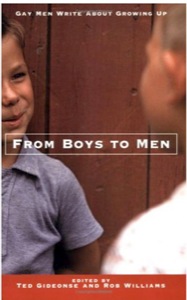-
- Man found guilty for injuring gay teenager and stabbing another man on trolley
- Transgender person assaulted with flashlight in Balboa Park
- Couple stabbed outside of CVS Pharmacy in Hillcrest
- San Diego Bulldogs to host first-ever wrestling tournament
- The Center and Momentum San Diego meet to energize repeal of ‘Don’t Ask, Don’t Tell’
- San Diego gets a whiff of art museum’s downtown expansion
- Community News
-
- Four Seattle-area gay men found with hard-to-treat strain of HIV
- Syndicated columnist, noted Texas liberal Molly Ivins dies
- Michigan court: Gay partners cannot get benefits from state universities, government agencies
- Before mea culpa, mayor’s missteps noticed in San Francisco
- Bush ready to sign off on massive spending bill
- GOP lawmaker offers same-sex union bill
- National News Briefs
- World News Briefs
Arts & Entertainment
From Boys to Men
Published Thursday, 08-Feb-2007 in issue 998
If only From Boys to Men had been published and available during my adolescence, I might have been quietly comforted to know that I wasn’t the only one who harbored these strange “gay” feelings. This well-written anthology of 22 short stories walks us through both painful and glorious memories of family, coming-of-age and our unique shared vision that has always set us apart from the pack.
The stories shared in From Boys to Men provide coping mechanisms to get us past those troubled years and soured memories of troubled youth, where we remained confused and anxious for some rainbow enlightenment. Reading this anthology will have you laughing and crying at the same time. This well-chosen grouping of gifted authors pulls on the heart strings, making some direct hits to our collective memory of queer isolation and sensitivity.
Many of the authors are quite generous with their secrets from the past. More than a few stories feel like a comfortable conversation with an intimate friend, some bordering on a truth-or-dare confession. This collection of gay stories is bright and joyous – not seeped in panting, sweat or moments of blissful ejaculation. Yes, there is hurt. Yes, there is pain. But it’s muted with the passage of time and their creative recollection to days gone by.
There are many “we are different” stories included in this anthology. Eric Karl Anderson’s “Barbie Girls” underscores his 11-year-old uniqueness and his penchant for leading his sister’s Barbie dolls down a sad road to suicide. It’s no wonder he felt more comfortable in the company of outcasts. Mike McGinty’s “Peristalsis” answers his mother’s constant question, “Why are you so sensitive?” McGinty’s essay describes a youthful journey that insists upon hiding who we are while surfacing sins from the past, such as daring to “sound like a woman.”
Angst is an ever-present ingredient in many of these stories. David Bahr’s “No Matter What Happens” juxtaposes his biological, witch-like mother against his initially caring foster mom. It underscores the importance of love in all its imperfect incarnations. Joe Jervis’ “Terrence” chronicles the danger, excitement and the fear of developing a friendship with a fierce, out-and-proud queen. It also educates by defining the three penis design styles, provides a fuller education on gay pronouns such as “she and her” and lets you know where “Lady Land” can be found.
Michael McAllister’s “Sleeping Eros” touches on the courage required for being yourself, and that parents can suffer the exact same traumas that we experience. Michael Gardner’s “The Competitive Lives of Gay Twins” seems to speak for itself. Lee Houck’s explores outing, damage and queer awareness in his grandfatherly tale titled “Inheritance.”
Vestal McIntyre’s “Mom-Voice” explores territory that incorporates the “faggy” voice, escape through soap opera and crushes on celluloid actors. “The Upshot” seemed to be Trebor Healey’s way of coming to grips with what was “wrong with him.” It educates by offering a way to confront nelly behavior that may have included touching, lusting and girl-talk with mom while doing the dinner dishes.
Any gay anthology would not be complete without confronting our boyish crushes and documenting the vast wasteland of broken hearts. Tom Dolby’s “Preppies are my Weakness” takes us to the boarding school where classes are never formally taught about errant genitalia or sudden erections. It broaches the subject of the early gay imprint as well. Austin Bunn’s “Guide” explores introductions to sex and allows us all to reflect upon our own guides into such frightening territory.
Aaron Hamburger’s “Whatever Happened to…” reminds us that there are “signs” to help us discover who we are, while Horehound Stillpoint’s “The Boy with the Questions and the Kid with the Answers” underscores painful memories about words that hurt: queer, homo, fruit, sissy, fairy, etc.
Todd Pozycki and Alex Chee take on weight, size and body issues, while “fitting in” is explored in essays by Viet Dinh. K. M. Soehnlein writes about his fantasy with soap operas, while D. Travers Scott likens the gore of horror-films.
It seems that all of the stories speak to that mysterious quality that made us uniquely different from most of our peers. Not all the stories cover as much territory as Francis Strand’s “Five Stories about Francis,” but they all celebrate the fact that we were destined to live a gay life. Raymond Green’s “Signs” underscores our gay destiny as does Jason Tougaw’s “Aplysia Californica.”
How lovely to look back upon those early years through the senses and observations of these gifted authors brought together by editors Ted Gideonse and Rob Williams. We can now sit back and enjoy their essays while allowing our own personal stories to be resurrected at the same time. I invite you to laugh, cry, enjoy and reflect.
And if you have a story to share about how you see the world differently, the editors invite you to visit the book’s Web site at http://anthology.gideonse.com/ and post your own story.
|
|
Copyright © 2003-2025 Uptown Publications


